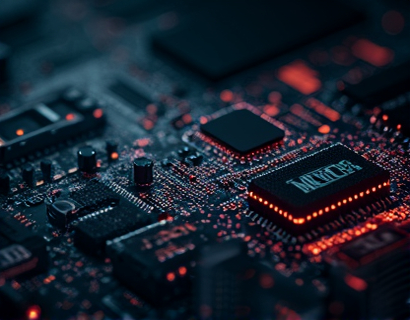Smart Contract Automation for Seamless Business Payment Management
In the rapidly evolving landscape of FinTech, smart contract automation stands out as a transformative force, particularly in the realm of financial management. This technology is revolutionizing how businesses handle the distribution of dividends, earnings, and scheduled payments. By leveraging the inherent properties of blockchain, smart contracts ensure secure, transparent, and efficient transactions, significantly enhancing the overall financial operations of companies.
The traditional methods of managing financial obligations are often cumbersome, prone to errors, and lack the necessary transparency. Manual processes require extensive oversight, increase the risk of human error, and can lead to delays in payment distributions. Smart contract automation addresses these challenges head-on, offering a robust solution that streamlines financial processes and boosts reliability.
Understanding Smart Contracts
At its core, a smart contract is a self-executing contract with the terms of the agreement directly written into code. These contracts run on a blockchain network, which ensures immutability and transparency. Once the predefined conditions are met, the smart contract automatically executes the agreed-upon actions without the need for intermediaries.
The use of smart contracts in financial management is particularly advantageous due to their ability to automate complex processes. For instance, in the context of dividend and earnings distribution, smart contracts can be programmed to release funds to shareholders or stakeholders as soon as the specified criteria are fulfilled. This not only accelerates the payment process but also minimizes the risk of fraud and errors.
Enhancing Efficiency in Dividend Distribution
One of the most significant applications of smart contract automation is in the distribution of dividends. Traditional dividend payouts involve multiple steps, including board approvals, financial audits, and manual transfers. Each step introduces potential delays and points of failure.
With smart contracts, the entire process can be streamlined into a few lines of code. Once the company's annual meeting is concluded and the dividend amount is determined, the smart contract can be triggered to release the funds automatically. This ensures that shareholders receive their dividends promptly and accurately, enhancing their trust in the company's financial management.
Moreover, smart contracts can be designed to handle various scenarios, such as different classes of shares with varying dividend rates. The contract can automatically calculate and distribute the correct amount to each shareholder based on their shareholding, eliminating the need for manual calculations and reducing the risk of errors.
Improving Earnings Distribution
Earnings distribution, particularly in the context of bonuses or profit-sharing, can also benefit greatly from smart contract automation. In traditional setups, the calculation of individual earnings and the subsequent distribution can be a time-consuming and error-prone process.
Smart contracts can be programmed to compute earnings based on predefined metrics, such as performance targets or sales quotas. Once the conditions are met, the contract can automatically release the earnings to the designated recipients. This not only speeds up the process but also ensures that all stakeholders receive their share accurately and transparently.
Additionally, smart contracts can incorporate complex logic to handle various distribution scenarios. For example, a contract can be designed to distribute earnings based on a percentage of the total profits, with different tiers for executives and employees. The automation ensures that each tier is correctly calculated and paid out, reducing the administrative burden and enhancing trust in the process.
Ensuring Security and Transparency
Security and transparency are paramount in financial transactions, and smart contracts excel in both areas. The blockchain's decentralized and immutable nature ensures that once a transaction is recorded, it cannot be altered or deleted. This provides an unbreakable audit trail, making it easier to track and verify transactions.
Smart contracts are also secure due to their cryptographic nature. The code that defines the contract is publicly visible, allowing stakeholders to review and audit it before deployment. Any changes to the contract require consensus from the network participants, adding an extra layer of security against unauthorized modifications.
Furthermore, the use of smart contracts reduces the reliance on intermediaries, such as banks and legal firms, which can be vulnerable to breaches and fraud. By eliminating these intermediaries, the risk of data breaches and manipulation is significantly reduced, ensuring that financial transactions remain secure and trustworthy.
Boosting Financial Control and Reliability
For businesses, the ability to automate financial processes through smart contracts translates to greater control and reliability. Automation reduces the need for manual intervention, minimizing the risk of human error and freeing up resources for more strategic tasks.
Smart contracts provide real-time visibility into financial transactions, allowing businesses to monitor and manage their obligations more effectively. This transparency helps in identifying potential issues early, enabling timely corrective actions. For instance, if a dividend distribution is delayed due to unforeseen circumstances, the smart contract can trigger alerts, enabling quick resolution.
Moreover, the programmable nature of smart contracts allows businesses to set up complex financial rules and conditions with precision. This flexibility ensures that financial processes are tailored to the specific needs of the business, enhancing overall efficiency and reliability.
Case Studies and Real-World Applications
Several companies have already begun to leverage smart contract automation for their financial management needs. One notable example is a major tech firm that implemented smart contracts for its quarterly dividend payments. By automating the process, the company reduced the payment cycle from several weeks to mere minutes, improving shareholder satisfaction and operational efficiency.
Another example is a financial services provider that uses smart contracts for bonus distributions based on performance metrics. The automation ensures that bonuses are calculated and paid out accurately and promptly, aligning employee incentives with company goals and reducing administrative overhead.
These case studies demonstrate the practical benefits of smart contract automation in financial management. By adopting this technology, businesses can achieve faster, more secure, and more reliable financial processes, ultimately leading to better financial health and stakeholder trust.
Challenges and Considerations
While the benefits of smart contract automation are clear, there are several challenges and considerations that businesses should be aware of. One of the primary concerns is the technical complexity involved in implementing smart contracts. Developing and deploying smart contracts requires a solid understanding of blockchain technology and programming skills.
Another consideration is the regulatory landscape. As FinTech solutions like smart contracts gain traction, regulatory bodies are beginning to take notice. Businesses must ensure compliance with relevant laws and regulations, which can vary significantly across different jurisdictions.
Additionally, the interoperability of smart contracts across different blockchain platforms can be a challenge. Ensuring that smart contracts can seamlessly interact with other systems and platforms is crucial for widespread adoption and integration into existing financial infrastructure.
Future Trends and Innovations
The future of smart contract automation in financial management looks promising, with ongoing innovations set to enhance its capabilities. One area of focus is the development of more user-friendly tools and platforms that simplify the creation and deployment of smart contracts. This will lower the barrier to entry for businesses of all sizes, making this technology more accessible.
Another trend is the integration of smart contracts with other FinTech solutions, such as artificial intelligence and machine learning. These combinations can further automate financial processes, provide predictive analytics, and offer personalized financial management services.
Moreover, the evolution of blockchain technology itself, such as the transition from public to private blockchains, will enhance the scalability and privacy of smart contract applications. This will make smart contract automation even more suitable for enterprise-level financial management.
Conclusion
Smart contract automation is poised to transform the way businesses manage their financial obligations. By automating the distribution of dividends, earnings, and scheduled payments, this technology offers unparalleled efficiency, security, and transparency. As the FinTech landscape continues to evolve, the adoption of smart contracts will become increasingly prevalent, driving significant improvements in financial processes and stakeholder trust.
For businesses looking to stay ahead in the competitive market, embracing smart contract automation is not just an option but a necessity. By leveraging this innovative technology, companies can streamline their financial operations, reduce costs, and enhance their overall financial management capabilities.











































